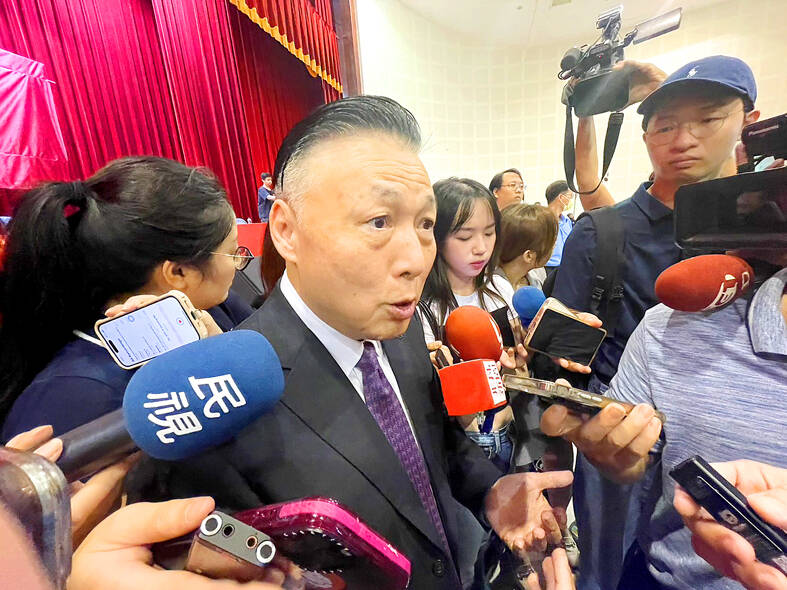ASE Technology Holding Co (ASE, 日月光投控), the world’s biggest chip packaging service provider, yesterday said it plans to spend NT$5.26 billion (US$162.15 million) acquiring a manufacturing facility from an affiliate as part of its latest efforts to expand advanced packaging capacity.
ASE is to acquire a fab, named K18, in Kaohsiung’s Nanzih District (楠梓) from Hung Ching Development and Construction Co (宏璟建設), ASE chief financial officer Joseph Tung (董宏思) told an online media briefing yesterday.
Advanced Semiconductor Engineering Inc (日月光半導體), a major subsidiary of ASE, jointly built the fab with Hung Ching. Advanced Semiconductor owns a 25 percent share in the fab.

Photo: CNA
Advanced Semiconductor also signed a cooperative development contract with Hung Ching in June 2020 to build the K13 plant, which was renamed the K18 plant.
“To accommodate the future operational growth of Advanced Semiconductor’s Kaohsiung plant, Advanced Semiconductor intends to exercise its right of first refusal to purchase the K18 plant from Hung Ching to meet the needs of expanding advanced production capacity,” Tung said.
ASE plans to add bumping and flip-chip packaging capacity at the K18 fab, Tung said.
Similarly, ASE in June said that it would jointly build a new plant, called K28, in Kaohsiung in cooperation with Hung Ching.
The capacity expansion aims to cope with growing demand for advanced packaging services used in artificial intelligence (AI) chips and high-performance computing (HPC) chips.
The fab is expected to start operations in the fourth quarter of 2026.
ASE has also expanded its advanced testing and packaging capacity overseas.
The company last week said it plans to buy 16 hectares of land in Kyushu, Japan, for about NT$701 million in preparation for building an advanced testing and packaging plant there.
ASE last month launched its second testing facility in San Jose, California, to expand advanced chip testing capacity such as burn-in testing to satisfy customers’ rising engineering needs for emerging semiconductor applications such as AI and HPC.
ISE Labs, fully owned by ASE, has spent about US$500 million on the company’s US labs and hired more than 200 Taiwanese employees.
Separately, ASE yesterday posted 6.7 percent annual growth in revenue for last month, rising from NT$48.35 billion to NT$51.6 billion and hitting the highest level since December last year.
On a monthly basis, revenue expanded 10 percent from NT$46.93 billion, a company filing with the Taiwan Stock Exchange showed.
During the first seven months, ASE has accumulated NT$324.64 billion in revenue, increasing 2.89 percent from NT$315.52 billion for the same period last year.

Semiconductor shares in China surged yesterday after Reuters reported the US had ordered chipmaking giant Taiwan Semiconductor Manufacturing Co (TSMC, 台積電) to halt shipments of advanced chips to Chinese customers, which investors believe could accelerate Beijing’s self-reliance efforts. TSMC yesterday started to suspend shipments of certain sophisticated chips to some Chinese clients after receiving a letter from the US Department of Commerce imposing export restrictions on those products, Reuters reported on Sunday, citing an unnamed source. The US imposed export restrictions on TSMC’s 7-nanometer or more advanced designs, Reuters reported. Investors figured that would encourage authorities to support China’s industry and bought shares

FLEXIBLE: Taiwan can develop its own ground station equipment, and has highly competitive manufacturers and suppliers with diversified production, the MOEA said The Ministry of Economic Affairs (MOEA) yesterday disputed reports that suppliers to US-based Space Exploration Technologies Corp (SpaceX) had been asked to move production out of Taiwan. Reuters had reported on Tuesday last week that Elon Musk-owned SpaceX had asked their manufacturers to produce outside of Taiwan given geopolitical risks and that at least one Taiwanese supplier had been pushed to relocate production to Vietnam. SpaceX’s requests place a renewed focus on the contentious relationship Musk has had with Taiwan, especially after he said last year that Taiwan is an “integral part” of China, sparking sharp criticism from Taiwanese authorities. The ministry said

CHANGING JAPAN: Nvidia-powered AI services over cellular networks ‘will result in an artificial intelligence grid that runs across Japan,’ Nvidia’s Jensen Huang said Softbank Group Corp would be the first to build a supercomputer with chips using Nvidia Corp’s new Blackwell design, a demonstration of the Japanese company’s ambitions to catch up on artificial intelligence (AI). The group’s telecom unit, Softbank Corp, plans to build Japan’s most powerful AI supercomputer to support local services, it said. That computer would be based on Nvidia’s DGX B200 product, which combines computer processors with so-called AI accelerator chips. A follow-up effort will feature Grace Blackwell, a more advanced version, the company said. The announcement indicates that Softbank Group, which until early 2019 owned 4.9 percent of Nvidia, has secured a

TECH SECURITY: The deal assures that ‘some of the most sought-after technology on the planet’ returns to the US, US Secretary of Commerce Gina Raimondo said The administration of US President Joe Biden finalized its CHIPS Act incentive awards for Taiwan Semiconductor Manufacturing Co (TSMC, 台積電), marking a major milestone for a program meant to bring semiconductor production back to US soil. TSMC would get US$6.6 billion in grants as part of the contract, the US Department of Commerce said in a statement yesterday. Though the amount was disclosed earlier this year as part of a preliminary agreement, the deal is now legally binding — making it the first major CHIPS Act award to reach this stage. The chipmaker, which is also taking up to US$5 billion